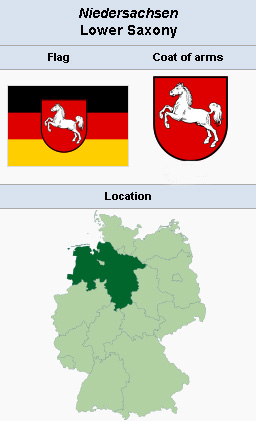Difference between revisions of "Niedersachsen (Germany)"
| [unchecked revision] | [checked revision] |
GameoAdmin (talk | contribs) (CSV import - 20130820) |
GameoAdmin (talk | contribs) (CSV import - 20130823) |
||
| Line 1: | Line 1: | ||
| − | [[File:niedersachsen.jpg|300px|thumb|right|''Niedersachsen | + | [[File:niedersachsen.jpg|300px|thumb|right|''Niedersachsen |
| − | Source: [http://commons.wikimedia.org/wiki/Main_Page Wikipedia Commons] | + | Source: [http://commons.wikimedia.org/wiki/Main_Page Wikipedia Commons]'']] In 1949 there were 2,800 Mennonites registered in Niedersachsen (Lower Saxony), most of them refugees from East and [[West Prussia|West Prussia]]. The unity among them was strengthened through their common origin, family relationships, and working together in receiving help from [[Mennonite Central Committee (International)|Mennonite Central Committee ]] (MCC). In the years following, those who wanted to be members of a congregation for personal faith reasons organized congregational groups as possible. Thus the groups in Luneburg and Celle belong to the Hannover congregation. Oldenburg belongs to the congregation at Leer. There are no Mennonite settlements in Lower Saxony. |
| − | |||
| − | '']] In 1949 there were 2,800 Mennonites registered in Niedersachsen (Lower Saxony), most of them refugees from East and [[West Prussia|West Prussia]]. The unity among them was strengthened through their common origin, family relationships, and working together in receiving help from [[Mennonite Central Committee (International)|Mennonite Central Committee]] (MCC). In the years following, those who wanted to be members of a congregation for personal faith reasons organized congregational groups as possible. Thus the groups in Luneburg and Celle belong to the Hannover congregation. Oldenburg belongs to the congregation at Leer. There are no Mennonite settlements in Lower Saxony. | ||
The congregations are small: Oldenburg with 110 members, Gottingen with 125 members, Hannover with 115 members. They meet in facilities rented from other denominations. Not all ministers have received theological training. The congregations are members of the [[Vereinigung der deutschen Mennonitengemeinden (Union of German Mennonite Congregations)|Vereinigung der Deutschen Mennonitengemeinden]] (Union of the German Mennonite Congregations) and work together with them in relief and the [[Internationale Mennonitische Organisation|International Mennonite Organization]]. A youth worker, whose activities extend beyond the boundaries of the congregation, was being supported. New congregations were organized as immigrants arrive from [[Russia|Russia]], for example, Wolfsburg with 50 members and Hannover with 38 members in 1987. | The congregations are small: Oldenburg with 110 members, Gottingen with 125 members, Hannover with 115 members. They meet in facilities rented from other denominations. Not all ministers have received theological training. The congregations are members of the [[Vereinigung der deutschen Mennonitengemeinden (Union of German Mennonite Congregations)|Vereinigung der Deutschen Mennonitengemeinden]] (Union of the German Mennonite Congregations) and work together with them in relief and the [[Internationale Mennonitische Organisation|International Mennonite Organization]]. A youth worker, whose activities extend beyond the boundaries of the congregation, was being supported. New congregations were organized as immigrants arrive from [[Russia|Russia]], for example, Wolfsburg with 50 members and Hannover with 38 members in 1987. | ||
Latest revision as of 14:13, 23 August 2013

In 1949 there were 2,800 Mennonites registered in Niedersachsen (Lower Saxony), most of them refugees from East and West Prussia. The unity among them was strengthened through their common origin, family relationships, and working together in receiving help from Mennonite Central Committee (MCC). In the years following, those who wanted to be members of a congregation for personal faith reasons organized congregational groups as possible. Thus the groups in Luneburg and Celle belong to the Hannover congregation. Oldenburg belongs to the congregation at Leer. There are no Mennonite settlements in Lower Saxony.
The congregations are small: Oldenburg with 110 members, Gottingen with 125 members, Hannover with 115 members. They meet in facilities rented from other denominations. Not all ministers have received theological training. The congregations are members of the Vereinigung der Deutschen Mennonitengemeinden (Union of the German Mennonite Congregations) and work together with them in relief and the International Mennonite Organization. A youth worker, whose activities extend beyond the boundaries of the congregation, was being supported. New congregations were organized as immigrants arrive from Russia, for example, Wolfsburg with 50 members and Hannover with 38 members in 1987.
Bibliography
Mennonitisches Jahrbuch (1982, 1985).
Unser Blatt. Published by MCC for refugees in Germany 1947-1949.
| Author(s) | Oskar Wedel |
|---|---|
| Date Published | 1987 |
Cite This Article
MLA style
Wedel, Oskar. "Niedersachsen (Germany)." Global Anabaptist Mennonite Encyclopedia Online. 1987. Web. 12 Feb 2026. https://gameo.org/index.php?title=Niedersachsen_(Germany)&oldid=93100.
APA style
Wedel, Oskar. (1987). Niedersachsen (Germany). Global Anabaptist Mennonite Encyclopedia Online. Retrieved 12 February 2026, from https://gameo.org/index.php?title=Niedersachsen_(Germany)&oldid=93100.
Adapted by permission of Herald Press, Harrisonburg, Virginia, from Mennonite Encyclopedia, Vol. 5, p. 631. All rights reserved.
©1996-2026 by the Global Anabaptist Mennonite Encyclopedia Online. All rights reserved.
